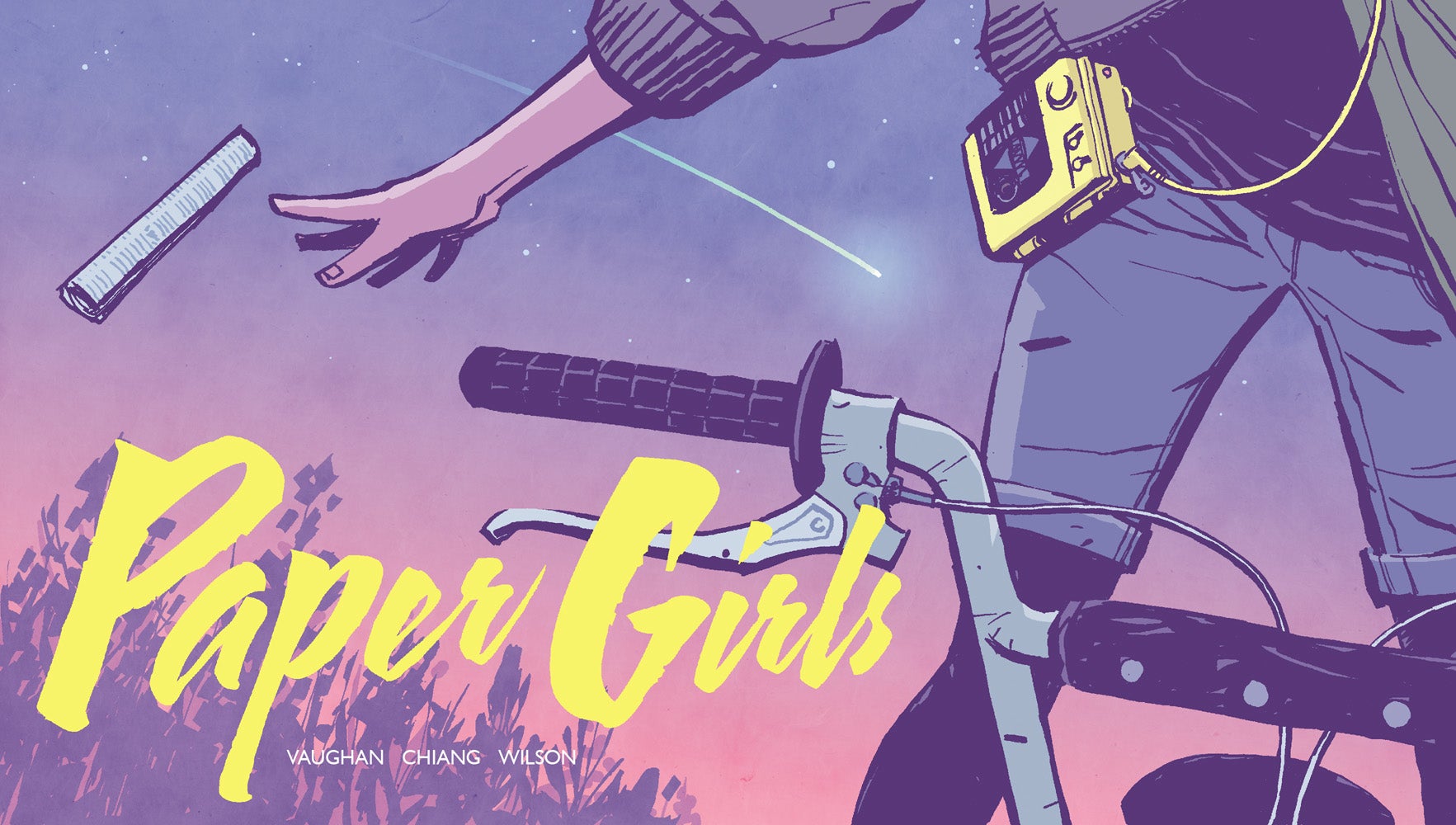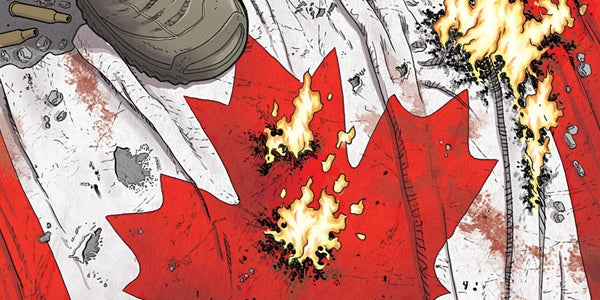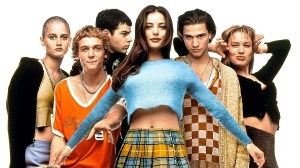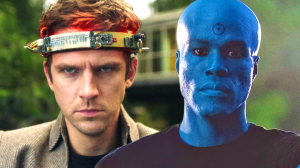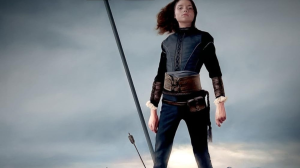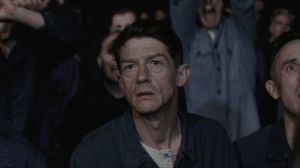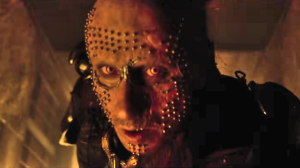Last week at Image Expo in San Francisco Brian K. Vaughan (Saga, Y: The Last Man) announced two new series to be released by Image Comics in 2015. He is collaborating with Cliff Chiang (Wonder Woman) on Paper Girls and Steve Skroce (The Amazing Spider-Man) on We Stand Guard. ComicBook.Com reporter and critic Chase Magnett along with Comics Therapy podcaster Andrea Shockling was able to speak with both Vaughan and Chiang during the event to explore the inspiration, intent, and ideas behind these exciting new projects.
Videos by ComicBook.com
Chase Magnett: You helped make two big announcements today. First, you have Paper Girls with Cliff Chiang – a new ongoing series.
Vaughan: Yeah, that’s coming later in 2015. We don’t have an exact month yet, but it will be later in the year.
Magnett: How long has this idea been gestating?
Vaughan: A long time. Cliff [Chiang] and I have been talking about it for almost a year or longer, but Cliff and I have been trying to work together for over fifteen years. So the collaboration has been a long time coming, but Paper Girls itself for just a little over a year.
Magnett: What made Paper Girls the right project to work with Cliff on?
Vaughan: I guess we are both relatively new dads and we’re around the same age. We’re interested in how different the time period when we grew up is going to be for our children, but I don’t think we are nostalgic for that time necessarily. So the period as well, I suppose. It just felt like the right story for Cliff at a gut level.
Magnett: It’s also an interesting return within your own career. This is your second time working on an ongoing series that focuses on adolescents. The first being Runaways.
Vaughan: Yeah.
Magnett: Has your approach towards those themes and that age of character changed with having children?
Vaughan: Definitely, and with growing older too and having more perspective on that time. Also, Runaways was really about teenagers and I think there’s a big difference between that and writing about twelve-year-olds. It’s a really unique period of your life. I don’t know about you, but that’s the year I read Watchmen. It feels like a lot of things that you’ll love for the rest of your life are forming at twelve.
I wanted to write about prepubescent girls because they don’t really care about the other sex right then. Even if you have a story with female protagonists, there is still either the love interest or the two boys they are trying to decide between. This is just a time where these girls don’t really give a shit about boys. It was refreshing.
Andrea Shockling: Does it then give you a chance to focus on their relationships without the distraction?
Vaughan: Totally. It’s much more about their relationships with each other and with their families. They are these sort of hardcore young entrepreneurs: twelve years old and going out in the middle of the night and shaking down clients. You have to collect your own money when you deliver newspapers. I really like writing about them as intriguing human beings.
Magnett: It also seems like an interesting balance of skill. Where Saga is an intergalactic epic sort of story with characters from all across space, Paper Girls focuses on four young girls in the suburbs.
Vaughan: Yeah, it is definitely… and here is Cliff Chiang! Here’s the artist of the book.
It’s definitely very grounded, but it’s not just a boring slice of life story. We will learn before the end of the first issue that there are epic stakes. You are right; it is never going to be Saga. It’s not a globetrotting space opera, but it’s still got some cool shit in it.
Cliff Chiang: I think with Brian you can always expect the unexpected. Things take a definite turn, it’s a little strange.
Vaughan: Yes.
Magnett: So in terms of plotting the series and breaking down the story, is that something you two did together, developing it from the start in tandem?
Vaughan: I think we started talking pretty early when I just had a one-page concept for it and brief verbal sketches of the characters. It was fleshing it out with Cliff where I think we built this into the much larger universe that it has become.
Shockling: I’d like to jump back in the conversation a little bit, Cliff. We were talking to Brian about the approach of writing about adolescents with the perspective of being a parent. I’m especially curious to your approach to young girls as an artist. Do you feel differently about how you want the girls themselves to be visually portrayed as a parent?
Chiang: I think so. As a parent and as a comics fan, I want these characters to feel real. I don’t want them to be… So often when they present kids, it is too varnished. It’s too cleaned up. Being a parent, you come see all the rough edges in your kids.
Shockling: You don’t want a caricature, but it doesn’t need to be porcelain, right?
Chiang: Right. One of the things we talked about was the movie Stand by Me and how when we were kids and watched that, we thought that was us. This is how kids talked. This is how kids react to each other. That’s something we wanted to capture, some authenticity.
Vaughan: It’s not the Nickelodeon version.
Chiang: Exactly.
Vaughan: Even though I watched a lot of Nick as a kid, I got the sense that these were adults writing idealized kids. In Stand by Me I saw twelve-year-olds who swore and smoked. It felt much more true to life.
Shockling: So is this a book for twelve-year-olds?
Vaughan: Like I was saying, I read Watchmen when I was twelve. I think it could be for precocious twelve-year-olds. When I was twelve, the last thing I wanted to read was an “all ages” book, where it felt like that was for little kids. I wanted to be reading shit written by cool adults who felt like they were writing at the top of their game. I wanted to reach beyond myself. So I hope it is for kids ages twelve to eighty-two.
I had a kid who was eleven who came up at a Saga signing, and he came up with his mom. I was like, “He read this comic? Do you know what dirty stuff is in here?” But I think there are some kids who are totally ready for that stuff. I was ten years old when the movie Stand by Me came out and it was rated R. My dad took me to see it, so I’m sure there are some ten-year-olds who Paper Girls would be the perfect book for them.
Chiang: You’ve been scarred ever since.
Vaughan: Yes. Still damaged goods.
Magnett: I think one of the joys of being a ten- or twelve-year-old is knowing what you’re not supposed to read and then sneaking into the library and grabbing it anyway.
Vaughan: Totally.
Chiang: Yes.
Magnett: Hopefully it doesn’t screw you up.
Vaughan: Experiences screw you up, but I think books are what kids are looking for. Not just to escape at that age, but for road maps, something that helps them understand this screwed up world that is equal parts horror and comedy and the supernatural. Everything just feels so much larger than life.
Shockling: Were those clues for Paper Girls? Supernatural and horror?
Vaughan: I think there is an element of all of that in this. We wanted to do a book that looks the way being twelve feels, and it feels like all of those things.
Shockling: You [Vaughan] mentioned Paper Girls is your most personal work to date. Can you talk a little bit more about that?
Vaughan: Yeah. I wasn’t a paperboy, I was way too lazy, I would be asleep at that hour. I grew up in the suburbs though and I think most of my best friends happened to be girls. So I’ve always wanted to write a story about that. It has a lot of my childhood crammed into this, even though it is much bigger than a slice of a life story as we said.
Chiang: When Brian told me the pitch for the book, I was intrigued by it for sure. Then I realized I had to do it when I knew if someone else drew it, I’d be so pissed. And I’d be picking the book apart every week or every month.
Vaughan: Yeah, this is not just autobiographical. I like that it has become very much a blend of Cliff’s upbringing and mine.
Chiang: Both in the suburbs.
Vaughan: Which have a lot of similarities, but also I think we have some differences. Two different perspectives that will really create a fun result. Sorry we can’t tell you more, but thank you for the interest.
Magnett: Do you know who you [Chiang] are planning on having help with the colors or are you doing it yourself?
Chiang: Matt Wilson is coloring and Jared Fletcher is doing the letters and design.
Vaughan: You worked with both of them on Wonder Woman.
Chiang: I have worked with them both.
Vaughan: And I’ve worked with Matt, who colored some Y: The Last Man and Jared lettered Ex Machina. It’s very cool to get to work with not just Cliff for the first time in years, but these guys again too.
Magnett: Both you [Chiang] and Matt Wilson on Wonder Woman brought some really dynamic designs, creating images that feel like they were pulled straight out of your own heads and brought to life on the page. Can we expect some similarly powerful design elements within Paper Girls?
Chiang: Yes. The imagery we showed today was deliberately prosaic. We’re definitely going to be getting a lot weirder and stranger as things go on. Otherwise I’d die.
Magnett: Are you planning on a Saga style release schedule?
Vaughan: Definitely. We will do an arc and then a little break so that Cliff will be able to draw until he is sick of me for the entire run of this ongoing series. So, do an arc, take a break, and put out the collection so people can get caught up.
Chiang: We will be doing one issue per year for thirty years.
Magnett: Whatever works.
Chiang: Spread it out.
Vaughan: But with an oversized first issue, then it will be our standard twenty-two pages like Saga, bigger than a Marvel or DC book.
Magnett: Thank you, Cliff. I have a couple of quick questions for you [Vaughan] about the other title you announced today We Stand On Guard.
Vaughan: Alright.
Shockling: Canada defeated by the United States.
Vaughan: Yes, “We Stand On Guard” is a line from the Canadian national anthem. So it’s a sort of covert reference. Canadians seem to pick up on it, but Americans are like, “It just sounds like a cool comic.”
Shockling: I hear it before hockey games and it still didn’t register.
Vaughan: Good.
Magnett: How did you and Steve Skroce come together to work on it?
Vaughan: We met at an early screening for Jupiter Ascending, the Wachowski’s new movie. I’d become friendly with the Wachowskis and Steve is their storyboard artist. He has been since The Matrix. He also worked on Speedracer.
Magnett: I’ve seen some of his storyboards for Jupiter Ascending and they’re astounding.
Vaughan: They are unbelievable. The guy is a beloved and much in demand storyboard artist. I think we were talking and we’ve both gotten to a point where we love Hollywood. We’re very grateful for the work, but we also miss the time when comics was our fulltime profession. So the stars aligned. I left my TV job and he’s taking a break from storyboarding, and he has an opportunity to return to comics in a huge way.
Magnett: How would you describe the tone of the story? When the concept of America invading Canada was mentioned earlier, there was a little bit of a chuckle in the audience.
Vaughan: Sure.
Magnett: But at the same time you mentioned giant robots and it being a war story.
Vaughan: Yeah. I know there is that old Michael Moore Canadian Bacon movie where it is easy. This is kind of like Y: The Last Man where you first hear it and you’re like, “This sounds like a goofy Ben Stiller comedy.” We really want to kind of play into the hype of its intelligence though. We want to play it as dramatic and action-packed, but still a war story with real consequences. It’s dark, but it also has big robots. It’s not just oppressive; it’s pretty fun.
Magnett: Is it going to contain a wide scope with a variety of different focal points or provide a more specific point of view?
Vaughan: We are following one small militia group: Canadian civilians turned freedom fighters. We really see it from their perspective. They’re the protagonists. They are who we are going to root for. Hopefully, even if you are American reading the book you will come to root for these Canucks instead of the invading Yanks.
Magnett: So it will be more of an All Quiet on the Western Front perspective from in the trenches.
Vaughan: I’ll take that comparison, sure.
Magnett: You did mention giant robots. How do the sci-fi elements plays into this as well?
Vaughan: It’s one hundred years in the future. I want to talk about the idea of invasion and topical subjects, but I also think sometimes it is easier to think about the world if you look through the sort of prism of science fiction. So we are pushing this one hundred years into the future and it’s a very different kind of invasion than the ones we’ve seen before.
Magnett: Invasion and war have been a strong theme in a lot of your books. Pride of Baghdad obviously meditates on the very real invasion of Baghdad. But there are a lot of strong allegories in Saga as wellthat reflect modern geopolitics. Is that something you see as a focus within this work as well?
Vaughan: Definitely. I realize that even in Paper Girls, though a different kind of war hangs over it, I think all my work is about people who are aware there is some sort of never-ending war going on, even if they are not intimately involved with it. But here in We Stand Guard, these guys are right on the front lines.

